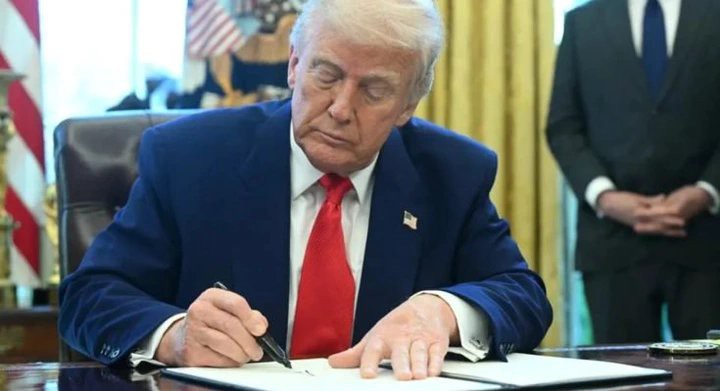The Trump administration has abruptly ended a major HIV vaccine research program, drawing sharp criticism from global health experts.
Diaspora Digital Media (DDM) can confirm that the $258 million initiative, involving top-tier institutions like Duke University and the Scripps Research Institute, was terminated without warning.
Officials from the National Institutes of Health (NIH) informed the program’s leaders that funding would be withdrawn, citing a shift in policy focus.
The HIV division at NIH stated it would now prioritize “currently available approaches” to combat the virus rather than invest in vaccine development.
This decision has raised alarm among scientists who say decades of research could be undone by what they describe as a hasty and politically motivated move.
The terminated initiative was not only exploring new vaccine options but also contributing to breakthroughs in COVID-19 treatments, autoimmune diseases, and antivenoms.
Dennis Burton, an immunologist leading the Scripps team, called the decision “very disappointing,” emphasizing the program’s success and future potential.
Many researchers and advocates fear this cutback marks the beginning of a broader rollback in HIV prevention efforts under Trump’s renewed administration.
In parallel developments, NIH has also paused a clinical trial for an HIV vaccine being developed by Moderna.
Additional funding intended for state and local HIV prevention programs was reportedly withheld in the same week.
In Texas, public health grantees were instructed to halt all HIV-related activities until further notice, leaving patients and clinics in uncertainty.
North Carolina’s Mecklenburg County Health Department has already laid off 10 HIV prevention staff members in response to the funding freeze.
Internationally, the impact may be even more severe, as African countries that rely heavily on U.S. funding report setbacks in their HIV control programs.
Mitchell Warren, executive director of AVAC, condemned the decision as “inconceivably shortsighted,” warning that lives will be lost as a result.
Despite progress in reducing new infections since 2010, the World Health Organization reported 1.3 million new HIV cases in 2023, including 120,000 children.
Researchers stress that eliminating HIV without a vaccine remains unlikely.
John Moore of Weill Cornell Medicine criticized the decision, saying it “kills the hope” of ending the pandemic through science.
He pointed out that the work being abandoned involved cutting-edge vaccine research centered around broadly neutralizing antibodies.
These antibodies, shown to protect against multiple HIV strains in lab animals, had been the focus of promising ongoing trials.
The now-terminated programs received seven-year NIH funding grants in 2019, with several more years of planned work remaining.
The Trump administration’s actions are not limited to vaccine research.
In recent months, it also dismantled the HIV prevention wing of the Centers for Disease Control and Prevention (CDC).
That division was responsible for supporting U.S. states and territories in their HIV prevention and outbreak response efforts.
Officials suggest some of these responsibilities may be reassigned to the newly announced “Administration for a Healthy America.”
However, no detailed plans or operational frameworks for the new agency have been released.
Meanwhile, the Department of Health and Human Services has declined to comment on the changes.
Critics argue that Trump’s shift marks a departure from his first-term support for HIV eradication efforts.
Previously, the administration had backed “Ending the HIV Epidemic,” a 10-year federal initiative aimed at drastically reducing new infections.
Yet under his second administration, key initiatives such as grants for PrEP, a medication that effectively prevents HIV transmission, have been axed.
In a particularly controversial move, funding was suspended for the President’s Emergency Plan for AIDS Relief (PEPFAR).
This U.S.-funded $7.5 billion program supplies life-saving HIV medications across Africa and many developing countries.
Though some treatment programs resumed through temporary waivers, prevention services, including condoms, education, and outreach, remain unfunded.
Experts say these are the exact tools needed to stop transmission, especially in vulnerable populations.
Dr. Burton and other scientists worry that clinical trials under the HIV Vaccine Trials Network (HVTN) will continue but without any new vaccine candidates in the pipeline.
Mitchell Warren summed up the crisis bluntly: “Almost everything in the field is hinged on work that those two programs are doing. The pipeline just got clogged.”
Observers warn that halting investment at this critical moment could cripple the global fight against HIV for years.
Health advocates stress that despite past failures, vaccines remain the only realistic long-term hope for eradicating HIV.
The research consortium was one of the few remaining groups worldwide equipped to test promising new vaccine concepts.
Global public health is now left facing a dangerous gap in innovation, leadership, and funding.
Many fear that without urgent intervention, this policy shift will lead to more infections, more deaths, and the unraveling of decades of hard-won progress.







